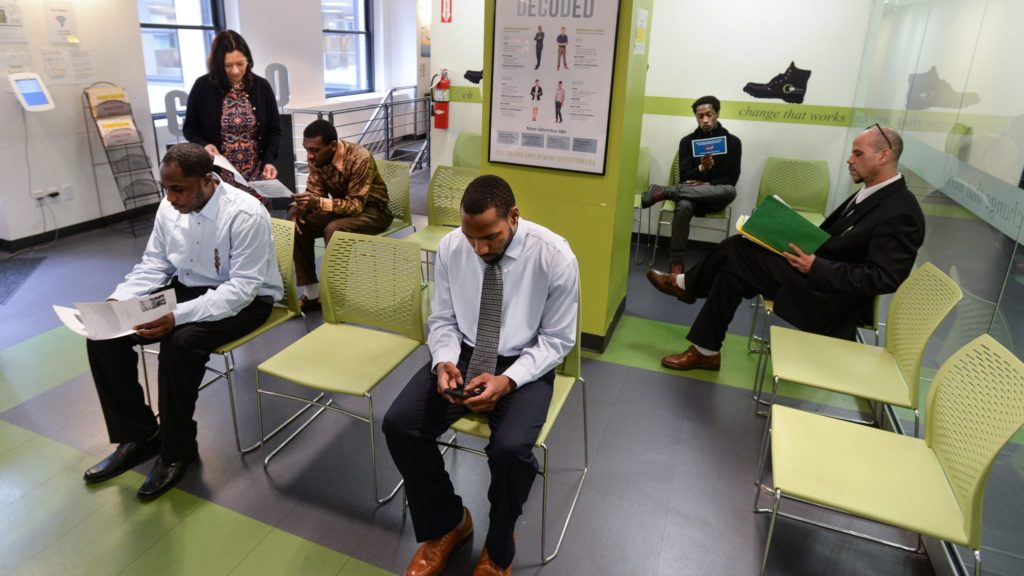Each year more than 600,000 people return home from incarceration, facing many barriers as they reenter the community. The Center for Employment Opportunities (CEO) utilizes nearly 40 years of experience in workforce development programming to provide transitional jobs and vocational training to some of those individuals.
CEO’s evidence-based program model was developed in New York City as a demonstration project of the Vera Institute of Justice in the 1970s. They now operate in 30 cities, including San Diego, across eleven states and have enabled more than 36,000 placements into full-time employment for individuals who were formerly incarcerated.
The San Diego Workforce Partnership connected with CEO to learn more about how this impactful work.
Tell me a little bit about the CalFresh-funded program and how it ties in with CEO.
CalFresh is California’s largest support for individuals in need of food security. CEO partners with the County of San Diego, the San Diego Workforce Partnership and the California Department of Social Services as a CalFresh Employment and Training (E&T) Provider. This is a federally-funded, state and county administered program that aims to increase the employment and earning capacity of CalfFresh recipients.
We help people enroll in CalFresh and make sure they have enough to eat. We then provide customized vocational services, which include a job readiness and health and safety orientation, on-the-job work experience, job coaching, job development and job retention services.
How does your work impact San Diego?
We seek to create greater opportunities through transitional employment and vocational services for justice-involved individuals who face significant barriers to economic success and mobility. CEO’s program is designed to develop and promote self-sufficiency through job-readiness training, employment experience, cognitive-behavioral interventions, vocational certifications, assistance with all aspects of the employment application process and retention services once employed.
CEO breaks the cycle of reincarceration and stems the persistence of poverty by addressing the immediate and long-term income needs of San Diego’s formerly incarcerated population. Since opening in 2011, CEO San Diego has engaged approximately 3,000 formerly incarcerated individuals returning to the community in our program services. Of these, CEO staff have made nearly 2,000 job placements to date for participants into unsubsidized employment. To date, CEO transitional work crews have provided over $5 million in taxable income to justice-involved San Diegans.
What are some barriers people you serve face and how do you help them overcome them?
CEO exists solely to provide justice-involved individuals with paid employment and vocational skills training/education so they can overcome the barriers they face to obtaining positive economic, health and social outcomes. Given that CEO’s high-need target population faces significant barriers to reentry, collaboration with multiple service providers is critical to our participants’ success. Internally, through relationships with local agencies and organizations, CEO ensures the provision of the following wraparound services for participants’ complex non-employment needs:
- Legal and financial needs: CEO San Diego created a sustainable partnership with the Homeless Court Program (HCP) to help people eliminate ongoing legal issues, tickets, fines or misdemeanor offenses. With the generous support of the San Diego County Bar Foundation, we successfully connected over 40 CEO participants to the HCP, helping them save $103,217 in fines, fees and court costs during our previous fiscal year.
- Food insecurity: Through our partnership with the San Diego Food Bank and their “Food to Non-Profits Program” CEO San Diego stores food on site at our office location, and allows our participants to take what they need to feed themselves and their families.
- Reentry navigation and coaching: Together, CEO staff and participants work to address all barriers internally or through external collaboration with community partners. Ultimately, our goal is to identify when a participant becomes “Job Start Ready”—at which point, our collaborative focus shifts from overcoming barriers to finding professional success through employment.
- Vocational training: CEO’s menu of credential-conferring trainings has been expanded this past year with improved capacity within our California sites. Offering more consistent and varied certifications has created increased opportunities for participants to complete multiple credentialed certification courses
How can someone get involved?
With the COVID-19 pandemic limiting our ability to offer traditional volunteer opportunities, we encourage individuals and corporations interested in getting involved to make a donation to support our continued work during this time. While there is tremendous visibility today, these are ongoing issues and warrant ongoing support. Please also consider joining other criminal justice advocates as a member of our Second Chance Society. More information regarding our Second Chance Society can be found on our website at ceoworks.org/second-chance-society.
We typically host volunteer experiences for corporate groups and individuals but, in light of COVID-19, these in-person volunteer events are now virtual. If you would like to schedule a volunteer event, we can work with you to create a customized, remote social impact experience. In all, we offer volunteer opportunities for:
- Assisting participants through virtual mock interviews and resume writing support.
- Community cleanups.
- Joining our Advisory Committee to help CEO grow our impact within the community.
- Hosting an essentials needs drive, such as a hygiene drive (soap, toothpaste, toothbrushes, deodorant, gender specific needs) or a toy drive during the holidays for our participants’ families.

